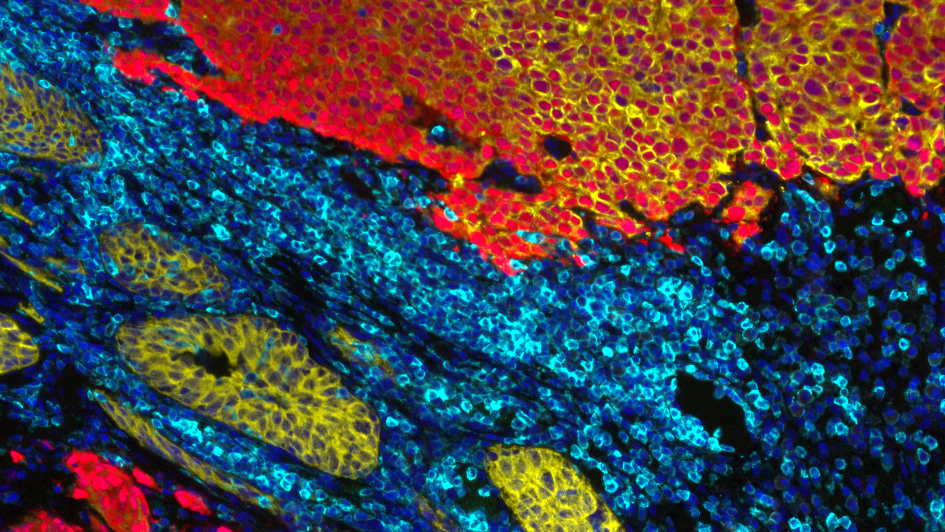Despite significant advancements in cancer treatment, immunotherapy has shown limited success in treating prostate cancer due to the unique resistance mechanisms of its tumours. However, researchers at The Institute of Cancer Research, London, are optimistic about a new form of targeted immunotherapy that hopes to overcome these challenges.
Despite significant advancements in cancer treatment, immunotherapy has shown limited success in treating prostate cancer due to the unique resistance mechanisms of its tumours. However, researchers at The Institute of Cancer Research, London, are optimistic about a new form of targeted immunotherapy that hopes to overcome these challenges.
T-cell engagers (TCEs) are an emerging targeted treatment that harness the body’s immune system to destroy cancer cells. While they have shown success in certain cancers, particularly in blood cancers that form in B cells – a type of immune cell – their clinical utility in prostate cancer remains unproven.
The first TCE, blinatumomab, was approved by the FDA in 2014 and European Union in 2023 for the treatment of B-cell acute lymphoblastic leukaemia. Since then, other TCEs have demonstrated effectiveness against cancers such as large B-cell lymphoma and non-Hodgkin lymphoma, leading to further regulatory approvals. Yet, translating this success to solid tumours remains challenging.
TCEs are a form of antibody designed to link the body’s cancer-killing immune T cells to tumour cells – one half is engineered to latch onto antigens found on the surface of cancer cells, while the other half binds to T cells. By bringing T cells directly to the tumour, TCEs help the immune system to attack the cancer more effectively.
TCEs application in prostate cancer
TCEs have shown promise in treating certain blood cancers. However, they present challenges for researchers in prostate cancers, partly because these are often considered to be ‘immune-cold’ tumours. Normally the immune system can recognise cancer cells and attack them. However, immune-cold tumours evade this response making it harder for TCEs to be effective.
In earlier trials, TCEs for prostate cancer faced additional difficulties. One of the first obstacles identified was their short lifespan in the body. This meant that frequent and prolonged infusions were required, placing a significant burden on patients and limiting clinical utility.
Recent innovations are addressing this issue by developing innovative approaches to improve the effectiveness and stability of TCEs in prostate cancer patients.
Leading the charge
The ICR is at the forefront of the fight against prostate cancer. In a recent editorial article, published in European Urology, Professor Johann de Bono, Regius Professor of Cancer Research at the ICR and Consultant Medical Oncologist at The Royal Marsden NHS Foundation Trust, examines the potential of TCEs to transform prostate cancer care.
Newer versions of TCEs with a longer lifespan are being designed, developed and trialled in the Drug Development Unit at the ICR and The Royal Marsden targeting multiple cell surface proteins such as PSMA, STEAP-1 and B7-H3 (published in Nature Reviews Oncology and Clinical Cancer Research, both in 2025). These TCEs may reduce the need for frequent treatments, meaning patients spend less time in hospital. Professor de Bono’s Prostate Cancer Targeted Therapy Group is currently recruiting for clinical trials of TCEs targeting cell surface antigens highly expressed on prostate cancer cells.
Not a simple journey
However, there are still challenges to address. Professor de Bono has stated that the side effects of TCEs can impact tolerability of these investigational medicines. One of the most serious is cytokine release syndrome – a systemic inflammatory response triggered by infections and certain therapeutic treatments that can cause fever, low blood pressure and breathing difficulties. It has also been reported that some patients experience neurological effects, including vision and hearing disturbances. Another challenge is that the body’s immune system can sometimes recognise these TCE therapeutics as foreign and produce antibodies to neutralise them, making them less effective.
As a result of these risks, researchers are increasingly focused on understanding which patients are likely to respond well to TCEs and which may be at higher risk of experiencing harmful effects. By selecting patients more precisely, the goal is to tailor treatment that maximises benefit while minimising unnecessary risk.
Another issue is that prostate cancers can create a hostile tumour microenvironment that suppresses the immune system. High levels of immune-suppressing signalling molecules can weaken T-cell activity, making it challenging for TCEs to work effectively. Researchers at the ICR believe that combining TCEs with other treatments that alter the tumour’s surrounding environment – which can often suppress the immune response – could approve their effectiveness by helping immune cells better recognise and attack prostate cancer.
The variability of prostate cancer – both between different tumours and within each tumour – presents another complication. Not all cancer cells express the same markers, meaning that a single TCE may not be effective for every patient. This has led to researchers exploring combination therapies targeting multiple cancer markers to improve response rates.
A promising road ahead
Despite the challenges, recent advancements in drug development and a deeper understanding of tumour biology mean that TCEs are rapidly advancing. Researchers at the ICR are refining their designs, improving their safety profiles and investigating how best to combine them with other treatments to enhance their impact and minimise adverse reactions.
Professor de Bono said: “A key focus for us at the ICR and The Royal Marsden will be to identify markers and antigens to assist us in selecting patients most likely to respond to treatment, ensuring that those who receive TCEs receive the maximum benefit with minimal risk.
“The future of TCEs in prostate cancer treatment is promising. As we see research progress, these therapies could move into earlier stages of prostate cancer, potentially increasing cure rates and transforming the way prostate cancer is treated.”
Although there are still obstacles to overcome, ongoing advancements suggest that TCEs have the power to revolutionise prostate cancer care in the years ahead.
